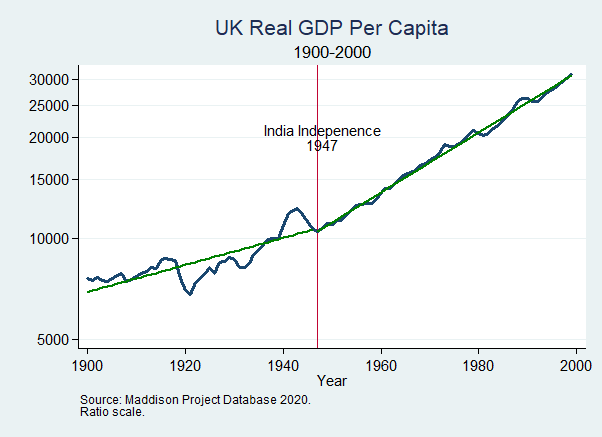"In The Road to Wigan Pier, George Orwell argued:
…the high standard of life we enjoy in England depends upon our keeping a tight hold on the Empire, particularly the tropical portions of it such as India and Africa. Under the capitalist system, in order that England may live in comparative comfort, a hundred million Indians must live on the verge of starvation–an evil state of affairs, but you acquiesce in it every time you step into a taxi or eat a plate of strawberries and cream. The alternative is to throw the Empire overboard and reduce England to a cold and unimportant little island where we should all have to work very hard and live mainly on herrings and potatoes.
Wigan Pier was published in 1937 and a scant ten years later, India gained its independence. Thus, we have a clear prediction. Was England reduced to living mainly on herrings and potatoes after Indian Independence? No. In fact, not only did the UK continue to get rich after the end of empire, the growth rate of GDP increased.

Orwell’s failed prediction stemmed from two reasons. First, he was imbued with zero-sum thinking. It should have been obvious that India was not necessary to the high standard of living enjoyed in England because most of that high standard of living came from increases in the productivity of labor brought about capitalism and the industrial revolution and most of that was independent of empire (Most. Maybe all. Maybe more more than all. Maybe not all. One can debate the finer details on financing but of that debate I have little interest.) The second, related reason was that Orwell had a deep suspicion and distaste for technology, a theme I will take up in a later post.
Orwell, who was born in India and learned something about despotism as a police officer in Burma, opposed empire. Thus, his argument that we had to be poor to be just was a tragic dilemma, one of many that made him pessimistic about the future of humanity."
No comments:
Post a Comment
Note: Only a member of this blog may post a comment.